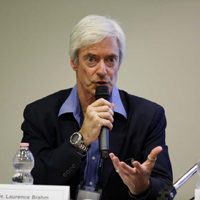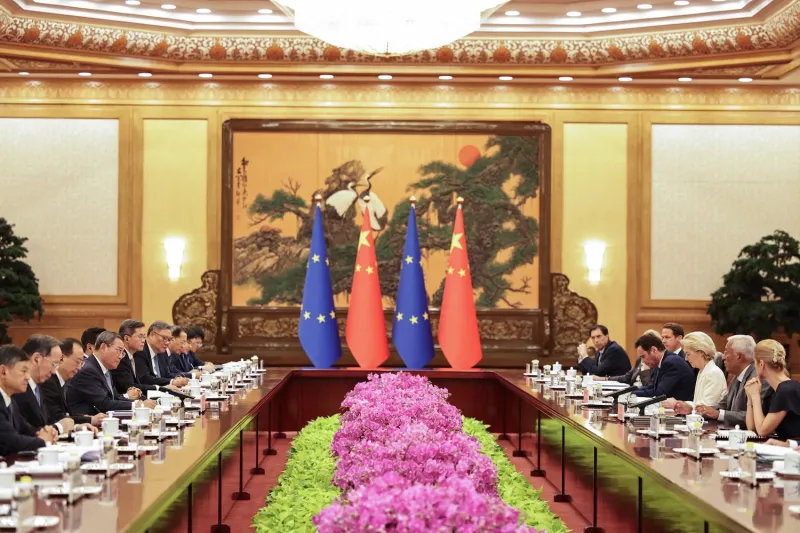Laurence Brahm: Going to America
September 21 , 2018he author (left) with Sheng Huaren who served as minister of the State Economy and Trade Commission established by Premier Zhu Rongji as a super ministry to oversee the massive state owned enterprise and industrial reforms. [Photo provided to chinadaily.com.cn]
By Laurence Brahm, a senior research fellow at CCG
Editor’s note: Laurence Brahm, first came to China as a fresh university exchange student from the US in 1981 and he has spent much of the past three and a half decades living and working in the country. He has been a lawyer, a writer, and now he is Founding Director of Himalayan Consensus and a Senior International Fellow at the Center for China and Globalization.
He has captured his own story and the nation’s journey in China Reform and Opening – Forty Years in Perspective. China Daily is running a series of articles every Thursday starting from May 24 that reveal the changes that have taken place in the country in the past four decades. Keep track of the story by following us.
In April 1999, the facts underscoring the China-US relationship on the eve of Premier Zhu Rongji’s visit to Washington DC were as follows: total trade between the two countries had reached 55 billion yuan in 1998, with the US becoming China’s second-largest trading partner and China the US’ fourth-largest. The US stood as China’s largest single investor in terms of contract value, with some 26,000 projects totaling US$21.4 billion waiting for Chinese government approval. As Zhu departed for the US, the central bank extended an olive branch,informing two of America’s largest insurance companies their license approval would be imminent.
On the eve of Zhu’s departure, a commentary by Minister Shi Guangsheng of the Ministry of Foreign Trade and Economic Cooperation appeared on the front page of the overseas edition of the People’s Daily. The commentary clarified Chinas position on trade issues, arguing “the reason for such a trade deficit is due to different calculating methods by both countries” and “many of China’s exports to America go through third countries, which increases the value of these exports.”
Shi pointed out many of China’s exports are actually produced by American-invested factories, adding “China produces many things which America no longer produces, so this should be good for America and should be considered.” In an attempt to reduce America’s trade deficit and put relations back on a positive track, China offered to import some $150 million worth of equipment, technology and products in connection with its own infrastructure needs. It was hoped this could pave the way for American acquiescence on China’s WTO entry during Zhu’s trip.
Topping Zhu’s agenda was completing negotiations for a final resolution on China’s bid for WTO entry. All the key power-brokers representing trade-related issues were in the delegation. Among them were State Councilors Wu Yi, the former MOFTEC minister responsible for the council’s trade portfolio, and Wang Zhongyu, who once headed the State Economy and Trade Commission. Zeng Peiyan, minister for the State Development Planning Commission, and then-MOFTEC Minister Shi Guangsheng rounded out the retinue. MOFTEC Vice-Minister Long Yongtu, who had led China’s WTO negotiating team for years, arrived in America ahead of Zhu’s team to lay the groundwork. Clearly, Zhu intended an all-out effort to close the deal.
Agendas sometimes differ, however. On Zhu’s arrival, the mood in America was tense. Zhu’s own sense of humor went above the heads of his audience.
When questioned in another press conference as to the possibility of China being a military threat to the US, Zhu responded, “Look at all your weapons. America’s nuclear weapons exceed China’s in quantity by several hundred times. The quality is also the best in the world. What are you afraid of?” At this point the microphone into which he spoke began to buzz, a technical mishap which drowned the room. “But the quality of America’s microphones is not very good,” Zhu added. An infuriated journalist leapt to his feet and pointed out the microphone was made in Europe. “Good,” Zhu casually replied. “Then that demonstrates opening our telecommunications sector to American cooperation still has value to us!”
On arriving in Washington, Zhu attended an environmental working session with US Vice President Al Gore. When the issue of America’s trade deficit came up, Zhu turned to Gore and said “Once America can export to China energy and environmental technology, then China will have a trade deficit. China is willing to spend a large amount of money on the environmental side to help the trade deficit.”
Clearly the issues were now out in the open. At a joint press conference at the White House, President Clinton read a prepared speech praising Zhu’s handling of the Asian financial crisis and China’s enterprise and financial reforms. He added he hoped to see China enter the WTO by 1999. Without notes — as was his style — Zhu responded, pointing out China’s entry into the WTO was also in America’s interest.
When Zhu spoke at the Massachusetts Institute of Technology the focus turned to America’s trade deficit with China. “China will not be an opponent of America,” he explained. “Our GNP is several dozen times less than America’s. Even after 30 or 40 years there will still be a huge deficit. So we should be your partner, not your opponent.”
He went on to add America’s controls over exports are extremely tight. “You don’t approve satellites but approve wheat and oranges. Of course we can live on wheat and oranges, but we Chinese would like to have a better standard of living.”
Clearly these were not things that Washington wanted to hear. They expected praise, awe and respect for the American system. Instead, they found Zhu to be tough and intense. He had come with a purpose and was not to be sidetracked from his main goal — China’s entry into the WTO. Two years later, those efforts would prove successful.
About Author

Laurence Brahm, a senior research fellow at Center for China and Globalization(CCG), an author of Zhu Rongji and the Transformation of Modern China.
Topical News See more






